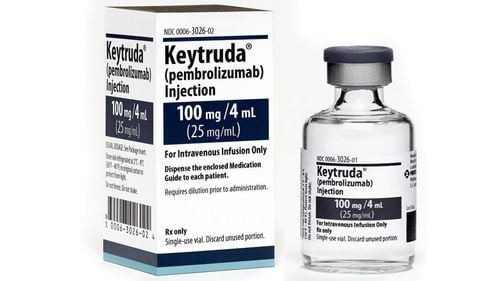This is an automatically translated article.
Alectinib is a Multikinase inhibitor, specifically used primarily in non-small cell lung cancer with mutations in the ALK gene. So what does Alectinib actually do and what issues should patients pay attention to during treatment?
1. What is Alectinib?
Active ingredient Alectinib is a multikinase inhibitor. Alectinib is a drug used to treat non-small cell lung cancer (NSCLC) with mutations in the ALK (Anaplastic Lymphoma Kinase) gene. This type of gene mutation accounts for about 5% of cases of non-small cell lung cancer (NSCLC).
The process of mutation leads to a defect in the ALK gene, which leads to the phenomenon of combining with other genes and causing cells to grow out of control. The end result is cancer with a positive ALK gene mutation test. Alectinib works by inhibiting the receptors of the mutated ALK gene, thereby stopping or slowing cancer metastasis.
Alectinib was approved for use by the US Food and Drug Administration (FDA) in 2015.
2. How does Alectinib work?
Alectinib is a prescription drug and is prescribed by doctors to treat NSCLC patients with the following accompanying characteristics:
Having ALK gene mutations; Cancer cells have spread to other parts of the body. Alectinib is currently only used in adults because safety and effectiveness in children have not been studied. Alectinib can cause some serious side effects during use, including:
Liver dysfunction (or hepatotoxicity): Your doctor should check your liver function at least every 2 weeks. for the first 3 months, then once a month and when in doubt during treatment with alectinib. Patients should notify their doctor when the following unusual symptoms such as frequent fatigue, decreased appetite, yellowing of the skin or eyes, dark urine, itchy skin, nausea or vomiting, lower flank pain right, easy bleeding or bruising...; Pulmonary/respiratory dysfunction: Alectinib can cause severe, even life-threatening pneumonia during treatment. It should be noted that the symptoms of this side effect can be similar to those of lung cancer. Patients should notify their physician immediately if new or worsening symptoms appear, including shortness of breath, increased breathing rate, cough or fever...; Kidney problems: Alectinib can cause serious, life-threatening kidney failure. Notify the doctor immediately if the patient notices a change in the amount or color of urine, new or worsening signs of swelling in the feet or ankles; Bradycardia: Alectinib can cause a very slow and sometimes very serious heartbeat. The treating doctor will check the heart rate and blood pressure of the patient taking Alectinib throughout the treatment. Notify your doctor when you have unusual symptoms such as dizziness, lightheadedness or fainting... At the same time, please talk to your doctor if you are using cardiovascular drugs or drugs to treat high blood pressure. ; Muscle pain, muscle weakness: This is a common side effect of Alectinib, some cases are sometimes very serious. Your treating physician will plan to monitor this with blood tests at least every 2 weeks for the first month and at any time (as needed) during treatment with Alectinib. Patients should promptly notify their physician of new or older but more serious muscle-related symptoms, including unexplained muscle pain, persistent muscle pain, or muscle weakness; Hemolytic anemia, or the breakdown of healthy red blood cells earlier than normal, may occur in some people taking Alectinib, as a result of not having enough red blood cells to function properly. If this occurs, your doctor may temporarily stop Alectinib and perform the necessary tests to check for this problem. If the hemolytic anemia side effect is correctly identified, the doctor may recommend starting Alectinib again but at a lower dose or sometimes permanently stopping Alectinib treatment. Signs suggestive of hemolysis, when detected, need to contact a doctor immediately, including jaundice, weakness, dizziness or shortness of breath. Before starting to use Alectinib, patients need to talk to their treating doctor about their previous medical history, including:
Have liver problems; Have lung disease or abnormal breathing function; Slow heart rate.
3. Instructions for using Alectinib
Patients with non-small cell lung cancer with ALK gene mutation should use Alectinib according to the instructions of the treating doctor, absolutely do not change the dose or stop the drug without a doctor's prescription. .
The treating physician may decide to change the dose, temporarily or permanently stop treatment with Alectinib if the patient has serious side effects. Alectinib should be used twice a day, taken with food with the capsule intact, do not chew, crush or open or dissolve the active ingredient in the capsule with another solution.
If the patient vomits after taking a dose of Alectinib, absolutely do not take more medicine to compensate. Instead, wait and take your next dose at the usual time of your daily dosing schedule.
Patients need to minimize sun exposure during treatment and after at least 7 days after stopping Alectinib. This active ingredient increases the risk of severe skin burns and sunburn, requiring patients to use creams and lip balms with an SPF of at least 50 to help protect against the sun.
Specific dosage of Alectinib:
Recommended dose: 600mg, taken 2 times per day (total dose is 1200mg/day); Take Alectinib with food.
4. Alectinib side effects
Alectinib can also lead to some of the most common side effects as follows:
Body fatigue; Constipation , difficult bowel movements; Swelling of hands, feet, ankles, face and eyelids; Muscle pain, muscle weakness; Anemia. The list of Alectinib side effects mentioned in this article may not be all of the side effects associated with Alectinib . For more information, talk to your doctor or pharmacist.
5. Some other notes when taking Alectinib
Patients should tell their doctor about a list of all medications they are taking, including prescription drugs, nonprescription drugs, vitamin or herbal supplements, before starting treatment with Alectinib. This helps doctors better manage drug interactions.
Women who are women before starting treatment with Alectinib should tell their doctor that they are pregnant or plan to become pregnant. Alectinib has been shown to cause harm to an unborn baby. In addition, patients taking Alectinib should promptly inform their doctor if they are pregnant or think they may be pregnant.
Women who may become pregnant should use effective contraception during treatment with Alectinib and for at least 1 week after the last dose.
Male patients being treated with alectinib and whose partners/partners can become pregnant should use effective methods of contraception during treatment and maintain for at least 3 months after stopping alectinib. .
Patients being treated with Alectinib should tell their doctor if they are breast-feeding or planning to breast-feed. Studies have not yet determined whether Alectinib passes into breast milk. Therefore, it is best not to breast-feed during treatment with Alectinib and for at least 1 week after the last dose.
Please dial HOTLINE for more information or register for an appointment HERE. Download MyVinmec app to make appointments faster and to manage your bookings easily.













